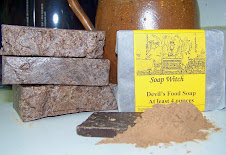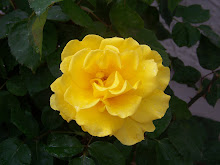Today, my youngest son was getting ready for a birthday party, and while pulling wrapping paper out of the closet, I found a lone bar of Devil's Food soap. It was from the first batch of chocolate soap I ever made, which had somehow fallen off the top shelf. This particular batch was made in December of 2009, with palm oil, cocoa butter, coconut oil, pomace olive oil, cocoa powder, vitamin E, sodium hydroxide, water and chocolate fragrance oil. Fragrance oil is needed in this formula because cocoa powder, coconut oil etc. do not add any scent to soap. When this batch was about one year old, I noticed that the delicious chocolate scent had faded. Now, there is no scent left at all, but the soap is mild and creamy with a low, lotion-like lather. It's so gentle that this morning I used it on my face. It cleans well without stripping.
I've since made subsequent batches of chocolate soap, replacing the water with coconut milk and adding a rich dark chocolate to the cocoa powder, but still the fragrance is gone by the time the soap is a year old. Shelf life for soap is tricky - the sweet spot for optimal hardness and mildness is about two years - but a lot can happen in two years. The oils used to make the soap can go rancid, or the scent components can fade. Often it's a trade off - do you want a strong beautiful scent or a luxurious, gentle lather and a harder bar? That's why I work so hard to make the formula gentle on the front end. My soaps are usually used up before they are two years old - unless they fall off a shelf and land behind the wrapping paper!
So now it's time to look for a longer lasting chocolate scent. My criteria for scent is:
*It should be phthalate-free
*It shouldn't be too tricky to work with
*The scent should last two years in the finished product
*It should be true
Phthalate-free: The use of phthalates is rather controversial. Some fragrances simply do not smell as good without them. Advocates argue that there are only trace amounts of phthalates in fragrance oils, and while massive amounts cause cancer in lab animals, human do not come into contact with that amount in their lifetime. The human body is like a filter: it keeps what it can use and filters out what it can't. Phthalates pass through the body harmlessly, and besides, they are within FDA guidelines.
My argument against their use is that we don't live in a controlled lab environment. We do not know how many phthalates we are already being subjected to in our daily lives. I prefer to avoid them when it's within my control, because there will always be some exposure that is not within my control. I rarely compromise on this unless I am making a soap specifically to someone's specifications, and they want a specific fragrance even if it contains trace amounts of phthalates. I've been in contact with many cancer survivors who make soap, and if they use fragrance, it's always phthalate-free. Nothing like cancer to influence someone to take their ingredients seriously. I'd rather take ingredients seriously now, before a wake-up call from illness.
(An edit to the above comment on pthalates: A couple of my friends have recently given me bottles of fragrance oil that they are no longer using. I don't know whether or not they contain pthalates. I'll try them anyway for use around the house because they smell gorgeous and I am too much of a frugality fanatic to let them go to waste. But when it comes to purchasing fragrance oils, the pthalate-free policy stands. If the manufacturer does not state that they are pthalate free, I will not purchase them unless someone specifically asks me to make them a soap with that fragrance oil.)
Not tricky to work with: Some fragrance oils and other scent components cause an acceleration of trace in the soap making process. Some can cause false trace, ricing and similar problems. Any of these complications can ruin a batch of soap if not dealt with effectively. There are things that can be done to work with a tricky fragrance oil, and I will put up with it if an oil is just too lovely. But if it's a beautiful scent and easy to work with, that's better.
Lasting scent: Some fade quickly, or change. I found a delectable, phthalate free bubble gum scent for one of my boys. I used it in a pure, mild olive oil soap, and the scent had morphed for delicious bubble gum into an odd rotten fruit smell before the soap had finished hardening. Not good. Some people are satisfied if the scent holds for six months. But in my opinion, two years is optimal.
True scent: Six different companies can create a fragrance with the exact same notes but a different bouquet. Some will smell more like the real thing than others. It depends on the nose too: Sometimes a scent advertized as one thing will smell like something else to a certain percentage of the population.
It's tough to find fragrance oils that meet all of the above criteria, but when we find one, it's a keeper!
Sunday, March 18, 2012
Subscribe to:
Posts (Atom)

